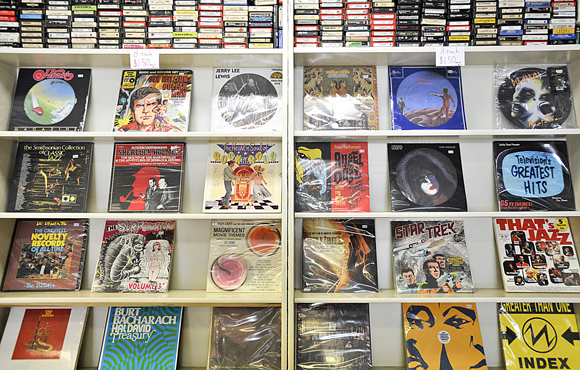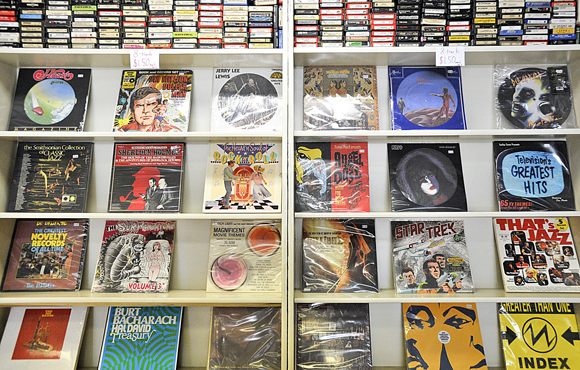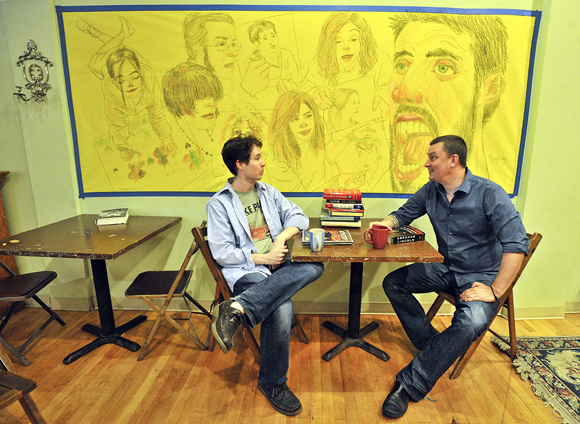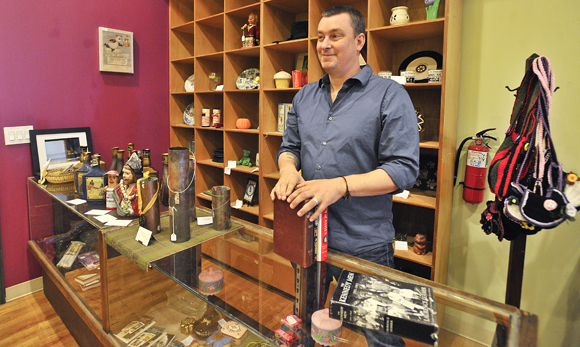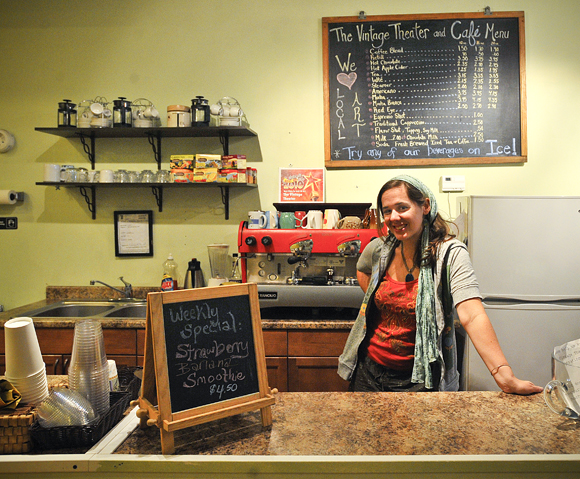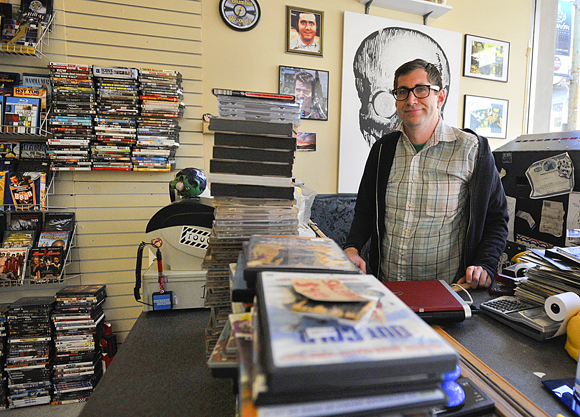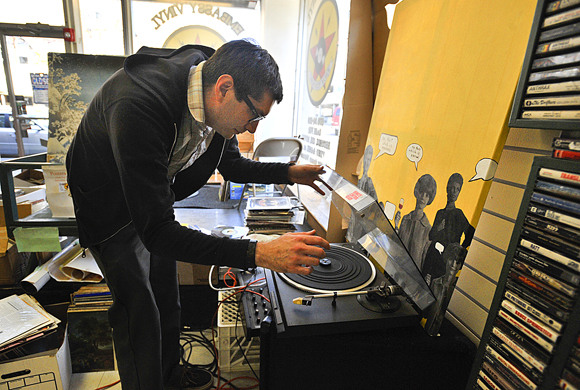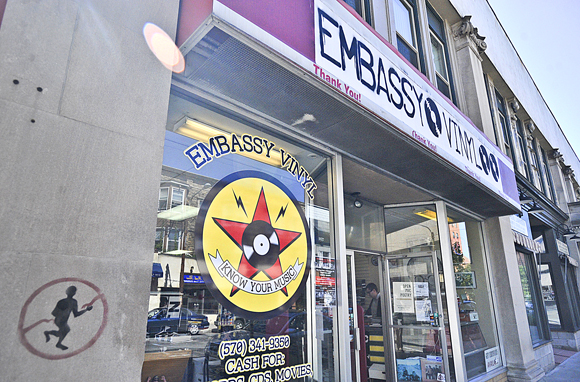Bill Black lives in a school that has been converted into apartments, but when he looks at Scranton, he imagines converting the city into a school. For that, he’s starting with books. Two projects come together in his hands: he’s vice president of Pages & Places, a non-profit which runs an annual book festival; and in September, he will take majority control of the Anthology bookstore as Pages & Places @ Anthology.
“Anthology,” Black says, “was founded by a guy who did jewelry because the mayor asked him to start a bookstore.” Anthology attracted reading groups, writers, and other aspiring or established cognoscenti. Nonetheless, it struggled to stay afloat. Last spring, the store lost its lease and Black stepped in to re-create it as Pages & Places @ Anthology, a scaled down bookstore and more explicit hub for lectures and intellectual exchange in confederation with the book festival. Instead of selling books, though, the new organization would produce an experience: new ideas circulating in Scranton as a learning city.
To facilitate the learning city, Black envisions creating outlets of Pages & Places @ Anthology within various businesses around the city, such as the Vintage Theater. This dispersion would accomplish three things according to Black: “It keeps the Anthology brand alive. We go from a city without a bookstore to a city with bookstores everywhere. Second, it drives traffic to the website,” where customers can order books. Amazon handles the transaction and then gives Anthology a cut. Anthology, in turn, donates its cut to different social causes each month. Finally, the diffused store model “allows Pages & Places to continue what it does–three times a month talks and an outdoor book expo at the festival.”
Although Pages & Places @ Anthology may seem a radical, rhizomatic approach to selling books, even traditional, independent brick-and-mortar stores such as PDQ Print Center, which has survived 35 years with a recent focus on sustainability and efficiency, must innovate to survive. Embassy Vinyl is another example. Like a bookstore, it could become a place for people to window shop before placing orders online, but the store has been selling records in downtown Scranton for five years.
Profiting with Urban Vitality
Owner R.J Harrington opened the business in an environment that already had iTunes, eBay, and MySpace. Nonetheless, Harrington took the leap because “I really like records, I really like music, and I didn’t have the talent to play it, but I wanted to be around it in some capacity.” His main focus is vinyl, although he carries CDs, movies, and other material. He keeps the business going by supplying a specific collector’s niche plus dedicated customer service. “The key is to keep getting more and more inventory to have what people are looking for. If we don’t have something, we go out of our way to get it.” His prices compete with eBay and he also offers a quality guarantee. “People,” Harrington says, “get exactly what they want.” No surprise scratches, no disappointments.
The Pages & Places @ Anthology project, Black concedes, won’t always generate a profit, but it’s not exactly intended to. “It’s service-oriented, but it’s difficult to articulate exactly what the service is: community, urban vitality. That translates into economic development.”
Black has been pondering the link between cultural life and economic development since working in Baltimore, where he saw talented artists and writers come for the city’s universities and then leave again. “I began thinking of the relationship between the artist and the city,” he explains. Black worked on grants to connect artists and business owners in cusp neighborhoods who needed help painting or advertising. He also made a pitch to get the work of local artists into local hotels.
Black brought those thoughts with him when he returned to Scranton. In 2009, he talked to fellow social entrepreneur Liz Randol about starting the Pages & Places Book Festival. He then realized he was participating in something bigger than a single event. “If we could pull it off, the city begins to look different to itself. You recognize what is already here and expose it to people.” What’s there is a demand for–as well as potential supply of–serious arts and culture. “It gives the city a number of opportunities to rebrand itself. It’s a small urban frontier with a range of things.” Pages & Places, meanwhile, has written its mission to be about more than book signings. It’s a non-profit devoted to livability, collaboration, and cross-pollination. Hence, reviving the fading Anthology store and spreading it around the city was a logical fit. Instead of a place that hosts a book festival, Scranton becomes a continual celebration of education and culture–and ultimately a city with myriad opportunities to learn, develop, and interact.
Like many cities, Scranton has seen its share of scratches and disappointments. Yet by helping people learn and find what they want, Harrington, Black, and other businesspeople continue to succeed.
MARK MEIER is a writer, independent consultant, and part-time professor who lives in Dunmore and plants butterfly gardens in Scranton (which is his back yard). Send feedback here.
PHOTOS:
Embassy Vinyl in Scranton
Conor O’Brien, co-director of The Vintage Theatre in Scranton and Bill Black, the co-director of Pages and Places and Anthology discuss the work they will be doing together.
Black inside the Vintage Theatre, which will be one of many sites for the Places and Pages bookstore
Ellen Doyle, co-director of The Vintage Theatre, in the coffee shop area of the business
Embassy Vinyl owner RJ Harrington in his shop on Adams and Mulberry Streets in Scranton
Harrington sets a record
Outside Embassy
All photographs by AIMEE DILGER
